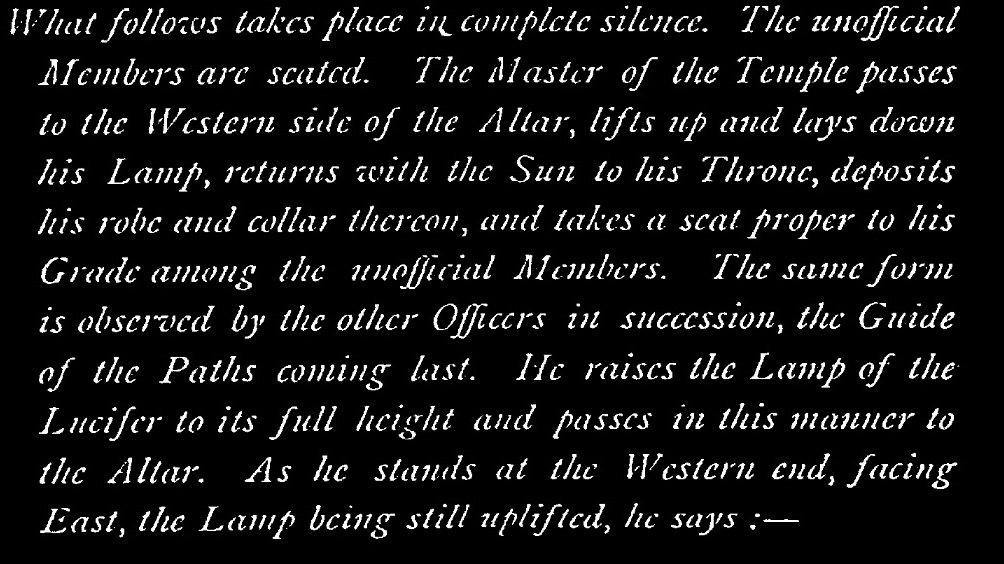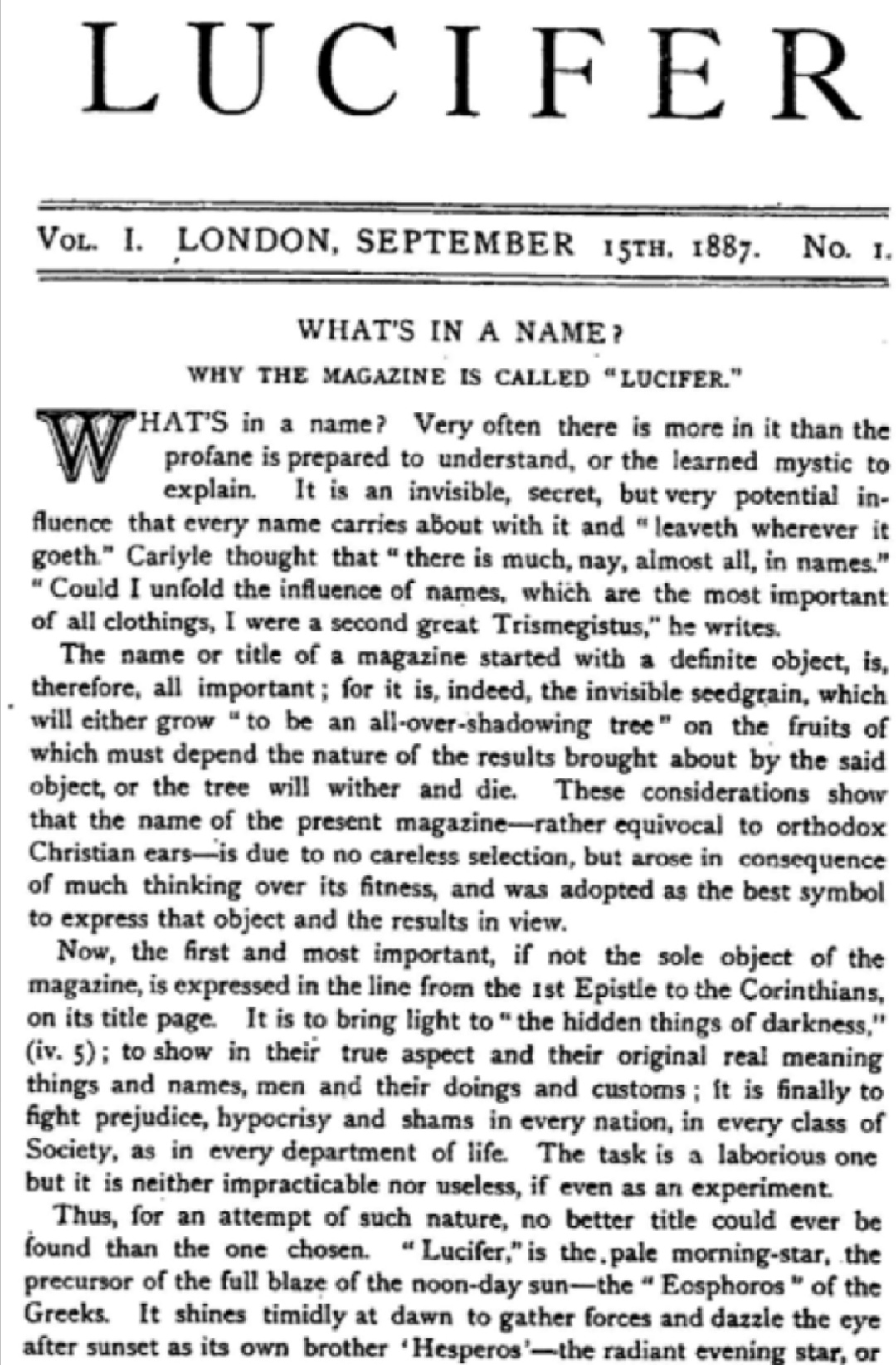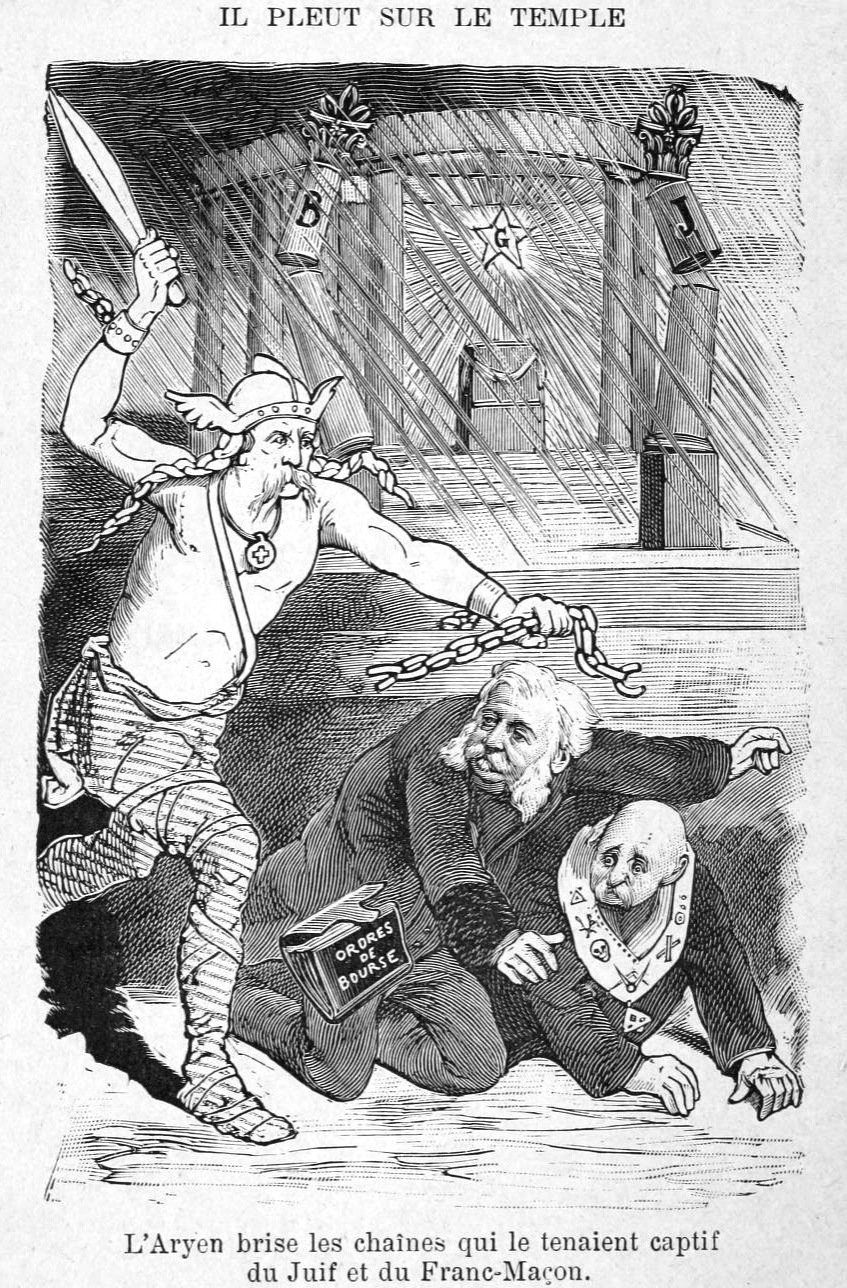It looks like you're using an Ad Blocker.
Please white-list or disable AboveTopSecret.com in your ad-blocking tool.
Thank you.
Some features of ATS will be disabled while you continue to use an ad-blocker.
share:
a reply to: Madrusa
Interesting post, a lot for me to ponder there 🤔 Got put off rituals when I was young, learned to be careful what I wished for, maybe it's time to ride the tiger again.
Introduction to Magic
There are certainly great benefits, sure helps me be calm, but excessive meditation seems to often make advanced practitioners disconnected emotionally and unable to act. View of reality is a big factor in that, many systems consider the material unreal. The monks are the worst, positive aspect of Mars is disdained, in trying to cut off Venus they go deviant and gay, never trust a man who kicks around town in a robe I reckon.
These two are the most overt ways used to corrupt us, and also the hardest aspects to control, media and social conditioning promotes unrighteous anger/-Mars and also a relentless barrage of loveless sex and messy relationships/-Venus.
Bringing up Mars without getting too angry and balancing it with order and Light is a work in progress, but feeling ok today... besides the ats thread talking to northerners sleep dep, anyway again it's been quite the journey.
How much injustice and hate will it take for people to rise against the evil bastards? I'd had enough years ago, worst thing for me would have been dying without ever having tried.
Just don't go all Brick...
Interesting post, a lot for me to ponder there 🤔 Got put off rituals when I was young, learned to be careful what I wished for, maybe it's time to ride the tiger again.
Introduction to Magic
There are certainly great benefits, sure helps me be calm, but excessive meditation seems to often make advanced practitioners disconnected emotionally and unable to act. View of reality is a big factor in that, many systems consider the material unreal. The monks are the worst, positive aspect of Mars is disdained, in trying to cut off Venus they go deviant and gay, never trust a man who kicks around town in a robe I reckon.
These two are the most overt ways used to corrupt us, and also the hardest aspects to control, media and social conditioning promotes unrighteous anger/-Mars and also a relentless barrage of loveless sex and messy relationships/-Venus.
Bringing up Mars without getting too angry and balancing it with order and Light is a work in progress, but feeling ok today... besides the ats thread talking to northerners sleep dep, anyway again it's been quite the journey.
How much injustice and hate will it take for people to rise against the evil bastards? I'd had enough years ago, worst thing for me would have been dying without ever having tried.
Just don't go all Brick...
edit on 1-11-2021 by primalfractal because: (no reason given)
a reply to: primalfractal
I had a Catholic upbringing and basically the more Roman it was the better, rituals, Saints Days, statues and Latin Mass, my parents the very incarnation of Jupiter and Juno that respected and expected those qualities within the Church as an institution, but not getting better to go all in and restore the glory that was Rome.
There was never any mention of Jesus within the home because deep down they knew that was cringe nonsense but those aspects could have been replaced with Dionysous and Apollo and it would have been all good but Divine Order was the most important.
It can be considered that the very essence of Jupiter is integrity, the integral system, and the Church lacked it the internal contradictions causings it's demise easily exploited by the Saturnine, so i would eradicate those and devise the system of absolute integrity to provide the framework for all other aspects.
The idea that there can be religious order and secular is of course silly, the secular is simply opposition to Divine Order, the negative aspect of Jupiter, currently it's perfectly demonstrating why it needs to be eradicated as it's evil and oppressive, the Theocracy humanity in harmony with the positive aspects of the Divine.
Anyway so you are reading Evola on magic, i would say generally he is concerned with the mysteries of the two outermost planets there, Uranian and Neptunian magic, but i hadn't read it.
I had a Catholic upbringing and basically the more Roman it was the better, rituals, Saints Days, statues and Latin Mass, my parents the very incarnation of Jupiter and Juno that respected and expected those qualities within the Church as an institution, but not getting better to go all in and restore the glory that was Rome.
There was never any mention of Jesus within the home because deep down they knew that was cringe nonsense but those aspects could have been replaced with Dionysous and Apollo and it would have been all good but Divine Order was the most important.
It can be considered that the very essence of Jupiter is integrity, the integral system, and the Church lacked it the internal contradictions causings it's demise easily exploited by the Saturnine, so i would eradicate those and devise the system of absolute integrity to provide the framework for all other aspects.
The idea that there can be religious order and secular is of course silly, the secular is simply opposition to Divine Order, the negative aspect of Jupiter, currently it's perfectly demonstrating why it needs to be eradicated as it's evil and oppressive, the Theocracy humanity in harmony with the positive aspects of the Divine.
Anyway so you are reading Evola on magic, i would say generally he is concerned with the mysteries of the two outermost planets there, Uranian and Neptunian magic, but i hadn't read it.
a reply to: primalfractal
If one stayed next door to me, and the lights went out, like a magician I would make him dissappear before the lights came back on
Haha
If one stayed next door to me, and the lights went out, like a magician I would make him dissappear before the lights came back on
Haha
a reply to: Madrusa
Here's what I think, Lucifer is not a being, Lucifer is knowledge, the light that lucifer brings is a higher state of consciousness, and for this to happen this light has to be released enmasse from lower beings that are stagnating, like pandas, although many humans are in the belief that they are at the pinnacle also, there is no room for change if you believe you can't go further.
This is described as immanentizing the eschaton
In the book illuminatus trilogy where they are trying to stop a biological weapon that is going to produce a mass sacrifice that will release the light required for the apocalypse and the awakening
It's not the strongest that will survive it is those that are most adaptable to change, shhh
Here's what I think, Lucifer is not a being, Lucifer is knowledge, the light that lucifer brings is a higher state of consciousness, and for this to happen this light has to be released enmasse from lower beings that are stagnating, like pandas, although many humans are in the belief that they are at the pinnacle also, there is no room for change if you believe you can't go further.
This is described as immanentizing the eschaton
In the book illuminatus trilogy where they are trying to stop a biological weapon that is going to produce a mass sacrifice that will release the light required for the apocalypse and the awakening
It's not the strongest that will survive it is those that are most adaptable to change, shhh
edit on 1-11-2021 by DAVG1980 because: (no reason given)
a reply to: DAVG1980
It was a phenomena of Dawn which involves turning to face the Sun, Morning star as the bringer of the Dawn
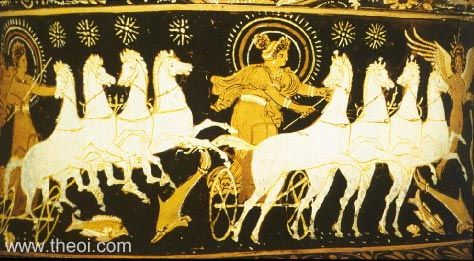
Ovid, Metamorphoses 2. 273 ff :
"As Lucifer (the Morning Star) [Eosphoros] more brilliant shines than all the stars, or as golden Phoebe [Selene, the Moon] outshines Lucifer (the Morning Star)."
In Classical tradition this is understood as relating to Venus but in the Western Semitic cults the Gods of Dawn and Evening related to Mars and they are likely the older.
Eosphorus
a reply to: DAVG1980
It was a phenomena of Dawn which involves turning to face the Sun, Morning star as the bringer of the Dawn
Heosphorus (Greek Ἑωσφόρος Heōsphoros), meaning "the dawn-bringer". The form Eosphorus is sometimes met in English. As an adjective, the Greek word φωσφόρος is applied in the sense of "light-bringing"
In Greek mythology, Hesiod calls Phosphorus a son of Astraeus and Eos

The gods Helius, Eos and Eosphorus--Sun, Dawn and Dawn-Star--form the procession of day. Eosphoros is depicted as a winged youth crowned with a shining aureole
Homer, Iliad 23. 226 ff (trans. Lattimore) (Greek epic C8th B.C.) :
"At that time when Eosphoros (Dawn Star) passes across earth, harbinger of light, and after him Eos (the Dawn) of the saffron mantle is scattered across the sea."
Ovid, Metamorphoses 2. 273 ff :
"As Lucifer (the Morning Star) [Eosphoros] more brilliant shines than all the stars, or as golden Phoebe [Selene, the Moon] outshines Lucifer (the Morning Star)."
In Classical tradition this is understood as relating to Venus but in the Western Semitic cults the Gods of Dawn and Evening related to Mars and they are likely the older.
Eosphorus
a reply to: DAVG1980
Aesop, Fables 211 (from Babrius 114) (trans. Gibbs) (Greek fable C6th B.C.) :
"There was a lamp drunk on his own oil who boasted one evening to everyone present that he was brighter than Eosphoros (the Morning Star) and that his splendour shone more conspicuously than anything else in the world. A sudden puff of wind blew in the lamp's direction, and its breath extinguished his light. A man lit the lamp once again and said to him, ‘Shine, lamp, and be silent! The splendour of the stars is not ever extinguished.’"
edit on 1-11-2021 by Madrusa because: (no reason given)
a reply to: Madrusa
Very interesting, especially the one where the lamp thinks he's a god, only to be extinguished
I think light and knowledge go hand in hand
For example, Lumineri, it dawned on me, was It prometheus who stole fire to give to humans? Enlightenment, bright spark, the light bulb went off
So many words and idioms relating light and knowledge
Cheers
Very interesting, especially the one where the lamp thinks he's a god, only to be extinguished
I think light and knowledge go hand in hand
For example, Lumineri, it dawned on me, was It prometheus who stole fire to give to humans? Enlightenment, bright spark, the light bulb went off
So many words and idioms relating light and knowledge
Cheers
a reply to: DAVG1980
If they were just going off the Classical tradition they would take Eosphorus as Venus, but really the two brothers as dawn and evening is Near Eastern relating to Mars, the quoutes in the last post were from the Equinox ritual in the archive i linked 15/16
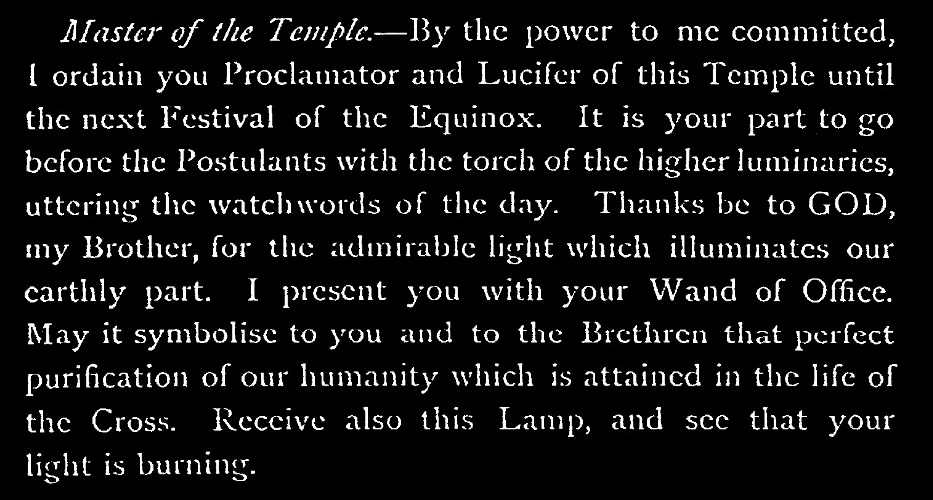
If they were just going off the Classical tradition they would take Eosphorus as Venus, but really the two brothers as dawn and evening is Near Eastern relating to Mars, the quoutes in the last post were from the Equinox ritual in the archive i linked 15/16

a reply to: Madrusa
Yet to travel to the outermost planets, but hope to see them soon.
I've read some Evola over the last few years, had a look at Intoduction to Magic when it came up in that funny cartoon, thought I'd go back over it, will perhaps attempt the ritual when an appropriate sacred liminal area appears. Gone to the deep forest for a while, arrived yesterday, so peaceful, although I have been coming to appreciate civilisation more recently.
It's written by various authors belonging to different traditions, a group he formed to promote a "great awakening", all fell apart at the end, rats in the corn.
Stresses the need to establish a still mind, mostly through Eastern meditation and alchemical allegory, before attempting the more advanced (but still preliminary) ritual works. Described as solar/dry/internal/shiva to lunar/wet/external/shakti. With the lunar methods being capable of transcending the solar and bringing about transmutation.
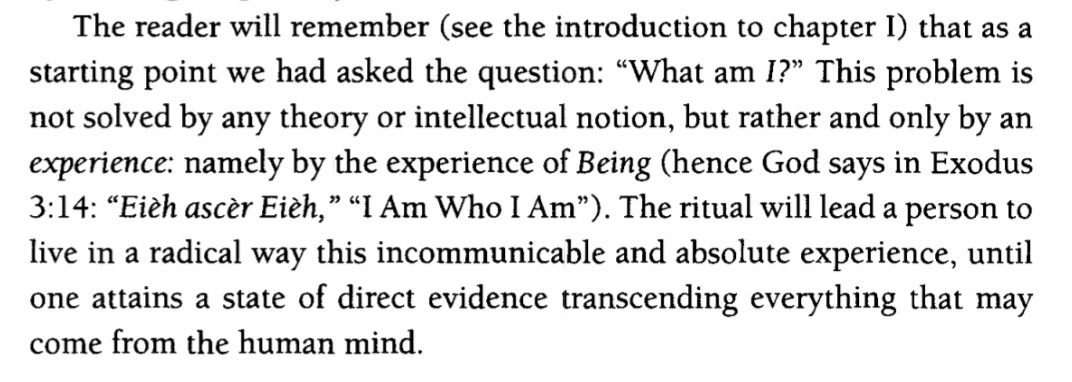
So pretty similar to what you are saying in that regard, I see the logic in it, establish order first as that will create the proper structural framework in the whole.
My understanding of Light is as the underlying all encompassing principle, the Light of Awareness.
The Trikas call this the goddess Paradevi, representing the union of Shiva and Shakti.
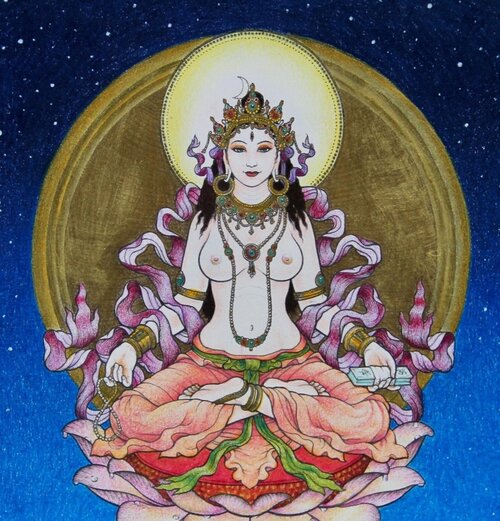
Cried when I first saw this picture, not sure why, some sort of past life thing? relief of spirit perceiving it's own fullness? Idk.
Sounds like quite the idyllic childhood, and as discussed, a solid foundation in order from perhaps the best readily accessible depiction of such in the West, Christianity, hence tied to our earlier traditions and racial identity. A nice safe place for a young Goddess to grow.
Juno was also considered a "light bearer".
I often listen to the extended version of this as a form of prayer, and the Christ part as internal in all of us rather than, you know, the Hebrew guy.
Yet to travel to the outermost planets, but hope to see them soon.
I've read some Evola over the last few years, had a look at Intoduction to Magic when it came up in that funny cartoon, thought I'd go back over it, will perhaps attempt the ritual when an appropriate sacred liminal area appears. Gone to the deep forest for a while, arrived yesterday, so peaceful, although I have been coming to appreciate civilisation more recently.
It's written by various authors belonging to different traditions, a group he formed to promote a "great awakening", all fell apart at the end, rats in the corn.
Stresses the need to establish a still mind, mostly through Eastern meditation and alchemical allegory, before attempting the more advanced (but still preliminary) ritual works. Described as solar/dry/internal/shiva to lunar/wet/external/shakti. With the lunar methods being capable of transcending the solar and bringing about transmutation.

So pretty similar to what you are saying in that regard, I see the logic in it, establish order first as that will create the proper structural framework in the whole.
My understanding of Light is as the underlying all encompassing principle, the Light of Awareness.
Now anything else—such as māyā [‘the power of illusion’], prakṛti [‘primordial materiality’], and so on—could not be the cause of any object or aspect of reality because anything separate from the Light of Awareness (cit-prakāśa) would be [by definition] unperceivable (aprakāśa), and therefore cannot be said to exist. On the other hand, if it is something manifest to perception (prakāśamāna), for that very reason, it is inseparable from, and of one nature with, the Light of Manifestation (prakāśa); and the nature of this light is simply Awareness (cit). So Awareness alone, and nothing else, [must be considered] the cause [of anything that appears].
The Trikas call this the goddess Paradevi, representing the union of Shiva and Shakti.

Cried when I first saw this picture, not sure why, some sort of past life thing? relief of spirit perceiving it's own fullness? Idk.
Sounds like quite the idyllic childhood, and as discussed, a solid foundation in order from perhaps the best readily accessible depiction of such in the West, Christianity, hence tied to our earlier traditions and racial identity. A nice safe place for a young Goddess to grow.
Juno was also considered a "light bearer".
Finally, she was known as Juno Lucina, or “Juno Who Brings Light,” for bringing light, life, and enlightenment to those who worshipped her.
I often listen to the extended version of this as a form of prayer, and the Christ part as internal in all of us rather than, you know, the Hebrew guy.
edit on 2-11-2021 by primalfractal because: (no reason given)
a reply to: primalfractal
"Being is aware of being" is only ever a thought away but that in harmony with the emotions, literally depth of being and height of understanding, this can only be realised through watching funny cartoons and if you're really good you get to have a ride on a Tiger as a special treat, even though you didn't even know you wanted to have a ride on a Tiger

You may be experiancing DM issues i see only 2/8 sent as read, i mentioned this in a DM...
"Being is aware of being" is only ever a thought away but that in harmony with the emotions, literally depth of being and height of understanding, this can only be realised through watching funny cartoons and if you're really good you get to have a ride on a Tiger as a special treat, even though you didn't even know you wanted to have a ride on a Tiger

You may be experiancing DM issues i see only 2/8 sent as read, i mentioned this in a DM...
a reply to: Madrusa
Oh I know a Tiger when I see one, I'll be good... promise 🌞
Yea def DM problems, I only received the two. Sent 7 and only 3 came up as being read but now none are. Anyway I just messaged mod DontTreadOnMe about it, hope they can sort it out, so wondering what you said right now.

Oh I know a Tiger when I see one, I'll be good... promise 🌞
Yea def DM problems, I only received the two. Sent 7 and only 3 came up as being read but now none are. Anyway I just messaged mod DontTreadOnMe about it, hope they can sort it out, so wondering what you said right now.
Some Buddhists believe that when one of their adherents departs from this world, they are placed by Guanyin in the heart of a lotus, and then sent to the western Pure Land of Sukhāvatī. Guanyin is often referred to as the "most widely beloved Buddhist Divinity" with miraculous powers to assist all those who pray to her, as is said in the Lotus Sutra and Karandavyuha Sutra.

edit on 2-11-2021 by primalfractal because: (no reason given)
originally posted by: Madrusa
a reply to: dashen
Maybe it's ironic that people argue over Lucifer when he was the Star of contention and if they ever agreed that would be his end, any who disagree are the real Luciferians...
Wow, I haven't heard this since the late 90s. That just took me down memory lane.
new topics
-
Paramilitary Leaks - John Williams
Whistle Blowers and Leaked Documents: 4 hours ago -
Some sausage, some chicken, some sauce, some onions and some garlic...and some peppers!
Food and Cooking: 6 hours ago -
Hearing more ambulances lately
Medical Issues & Conspiracies: 6 hours ago -
Los Angeles brush fires latest: 2 blazes threaten structures, prompt evacuations
Mainstream News: 6 hours ago -
House Passes Laken Riley Act
Mainstream News: 7 hours ago -
The more I think about it
General Chit Chat: 7 hours ago -
What Comes After January 20th
Mainstream News: 9 hours ago -
Canada as a state .. how would it work?
General Chit Chat: 9 hours ago -
Those stupid GRAVITE commercials
Rant: 10 hours ago -
Let's Buy Greenland
General Chit Chat: 11 hours ago
top topics
-
House Passes Laken Riley Act
Mainstream News: 7 hours ago, 22 flags -
What Comes After January 20th
Mainstream News: 9 hours ago, 18 flags -
Claim: General Mark Milley Approved Heat and Sound Directed Energy Weapons During 2020 Riots
Whistle Blowers and Leaked Documents: 15 hours ago, 12 flags -
Planned Civil War In Britain May Be Triggered Soon
Social Issues and Civil Unrest: 14 hours ago, 7 flags -
Let's Buy Greenland
General Chit Chat: 11 hours ago, 6 flags -
Those stupid GRAVITE commercials
Rant: 10 hours ago, 5 flags -
Hearing more ambulances lately
Medical Issues & Conspiracies: 6 hours ago, 5 flags -
Los Angeles brush fires latest: 2 blazes threaten structures, prompt evacuations
Mainstream News: 6 hours ago, 4 flags -
The more I think about it
General Chit Chat: 7 hours ago, 4 flags -
Canada as a state .. how would it work?
General Chit Chat: 9 hours ago, 4 flags
active topics
-
Planned Civil War In Britain May Be Triggered Soon
Social Issues and Civil Unrest • 14 • : WeMustCare -
Los Angeles brush fires latest: 2 blazes threaten structures, prompt evacuations
Mainstream News • 10 • : WeMustCare -
Inca stone masonry at Sacsayhuaman, Ollantaytambo and the Sun Temple
Ancient & Lost Civilizations • 23 • : Hansllune -
Paradox of Progress
Ancient & Lost Civilizations • 14 • : Hansllune -
Let's talk planes.
General Chit Chat • 10 • : Dalamax -
Paramilitary Leaks - John Williams
Whistle Blowers and Leaked Documents • 8 • : caterpillage -
Claim: General Mark Milley Approved Heat and Sound Directed Energy Weapons During 2020 Riots
Whistle Blowers and Leaked Documents • 25 • : NoCorruptionAllowed -
Meta Llama local AI system is scary good
Science & Technology • 47 • : glend -
House Passes Laken Riley Act
Mainstream News • 15 • : KrustyKrab -
What Comes After January 20th
Mainstream News • 23 • : Enduro


